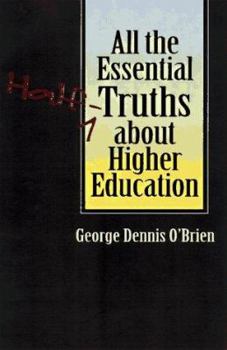All the Essential Half-Truths about Higher Education
Select Format
Select Condition 
Book Overview
In this refreshing and original exploration, George Dennis O'Brien looks at higher education in America. O'Brien argues that to debate intelligently the future of education we must stop focusing on its ideals and look instead at its institutions. He does this by addressing nine half-truths, such as whether "low cost public education benefits the least advantaged in society," and goes on to examine how accurately they reflect the true state of higher education. The result is a thought-provoking discussion of the present challenges and future prospects of American higher education. "O'Brien's historical overview of the transition from 19th-century denominational colleges to 20th-century research-driven and largely secular ones is provocative. Cleverly written and well-focused, the book addresses the financial pressures facing higher education and asks vital questions about cutbacks and curricula."--Publishers Weekly "Lively, engaging, and richly suggestive." --Francis Oakley, Commonweal
"O'Brien employs calm, powerful reason, without sensationalism. His perspective is illuminating. . . . All the Essential Half-Truths About Higher Education is one of the wisest and most useful treatments of American higher education." --John Attarian, Detroit News
"O'Brien employs calm, powerful reason, without sensationalism. His perspective is illuminating. . . . All the Essential Half-Truths About Higher Education is one of the wisest and most useful treatments of American higher education." --John Attarian, Detroit News
Format:Hardcover
Language:English
ISBN:0226616541
ISBN13:9780226616544
Release Date:January 1998
Publisher:University of Chicago Press
Length:266 Pages
Weight:1.15 lbs.
Dimensions:1.2" x 5.5" x 8.5"
Customer Reviews
2 ratings
This is a great book!
Published by Thriftbooks.com User , 22 years ago
I highly recommend this book whether you are a student, parent of a soon-to-be college student, are considering a career in academia or are just plain curious. It is very well written, witty and highly informative. I always recommend it to my friends in academia, especially when the subject of tenure comes up, which he discusses at length. He also discusses the history of the university, which I find very fascinating. All in all, an excellent read.
Provocative, insightful and, yes, even funny
Published by Thriftbooks.com User , 26 years ago
O'Brien's title references what he terms the "half-truth" that the faculty is the university. His answer is, "of course, but ..." Drawing on his presidency at Bucknell, and his Hegel scholarship, O'Brien argues that an institution represents something else more difficult to identify but just as important: an ethos, a culture, a set of binding ideals, all of which are continually (re)created by the interaction of faculty with institutional tradition. While others like Donald Kennedy have also briefly noted the idea of a greater degree of centralized direction, if not control, O'Brien takes the idea much further both theoretically, and practically, by proposing specific faculty positions intended to strengthen in the long-term an institution's intellectual culture. Finally, O'Brien argues, in an academic version of Michael Porter's doctrine of "competitive advantage," that institutions ought to capitalize on their differences rather than accentuate their sameness. All in all, a provocative, insightful and, yes, even funny meditation on the relationship between institutional structure and institutional character.






